Analysis of Disruptive Technologies and Supply Chain Management
VerifiedAdded on 2022/12/16
|11
|4316
|374
Essay
AI Summary
This essay delves into the realm of disruptive technologies and their transformative impact on supply chain management. The essay begins with an introduction to supply chain management, emphasizing its critical role in coordinating the flow of goods and services, from raw materials to finished products. It then identifies and discusses two key disruptive technologies: Artificial Intelligence (AI) and the Internet of Things (IoT). The body of the essay explores the applications, benefits, and potential drawbacks of these technologies within the context of supply chain management. AI's capabilities in areas such as inventory management, warehouse efficiency, and customer demand forecasting are examined. The essay also explores the role of IoT in improving data accuracy and enhancing various supply chain operations. The essay concludes by offering insights into mitigating the risks associated with these technologies and providing recommendations for managers. The essay is a comprehensive analysis of disruptive technologies and their impact on supply chain management.
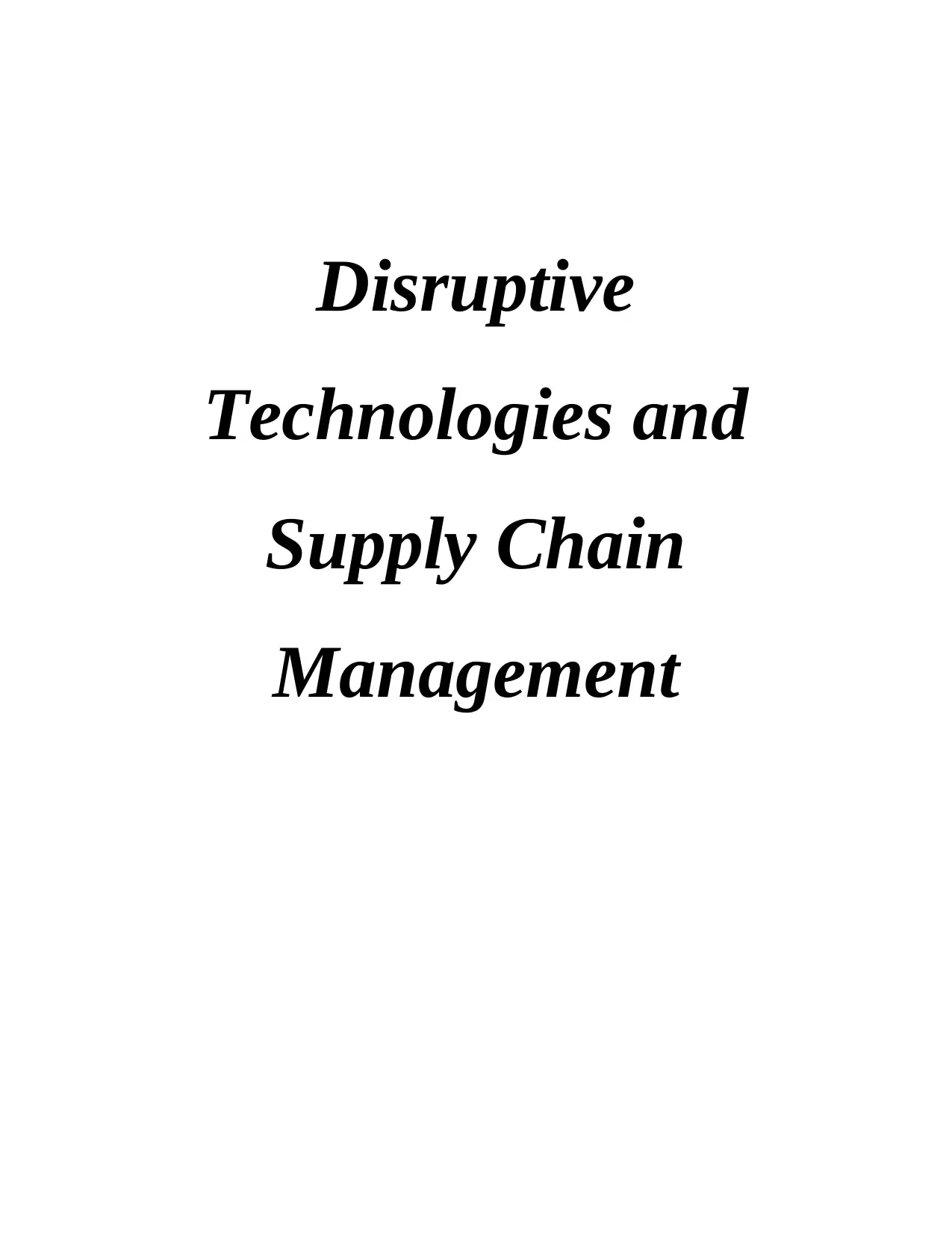
Disruptive
Technologies and
Supply Chain
Management
Technologies and
Supply Chain
Management
Paraphrase This Document
Need a fresh take? Get an instant paraphrase of this document with our AI Paraphraser
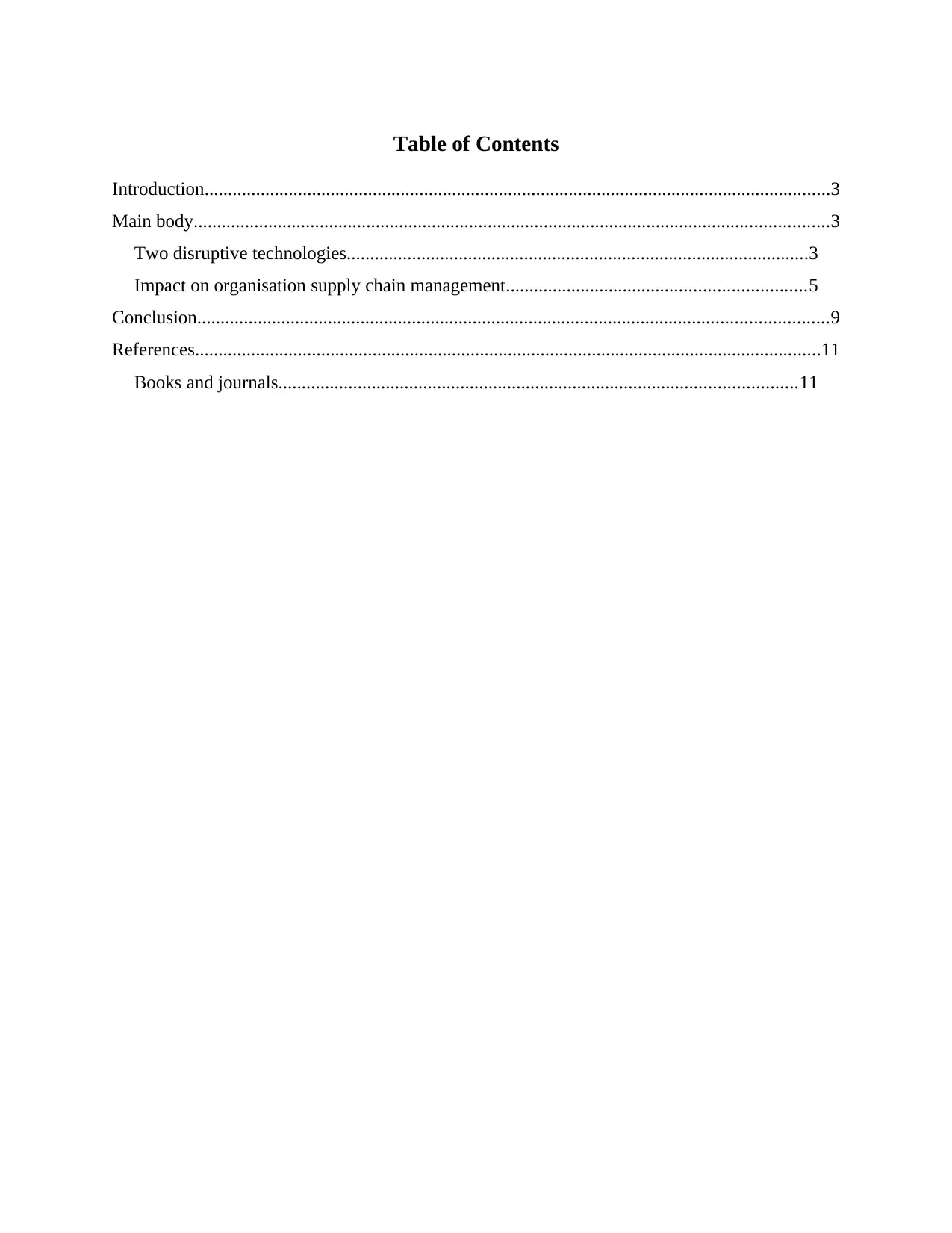
Table of Contents
Introduction......................................................................................................................................3
Main body........................................................................................................................................3
Two disruptive technologies...................................................................................................3
Impact on organisation supply chain management................................................................5
Conclusion.......................................................................................................................................9
References......................................................................................................................................11
Books and journals...............................................................................................................11
Introduction......................................................................................................................................3
Main body........................................................................................................................................3
Two disruptive technologies...................................................................................................3
Impact on organisation supply chain management................................................................5
Conclusion.......................................................................................................................................9
References......................................................................................................................................11
Books and journals...............................................................................................................11
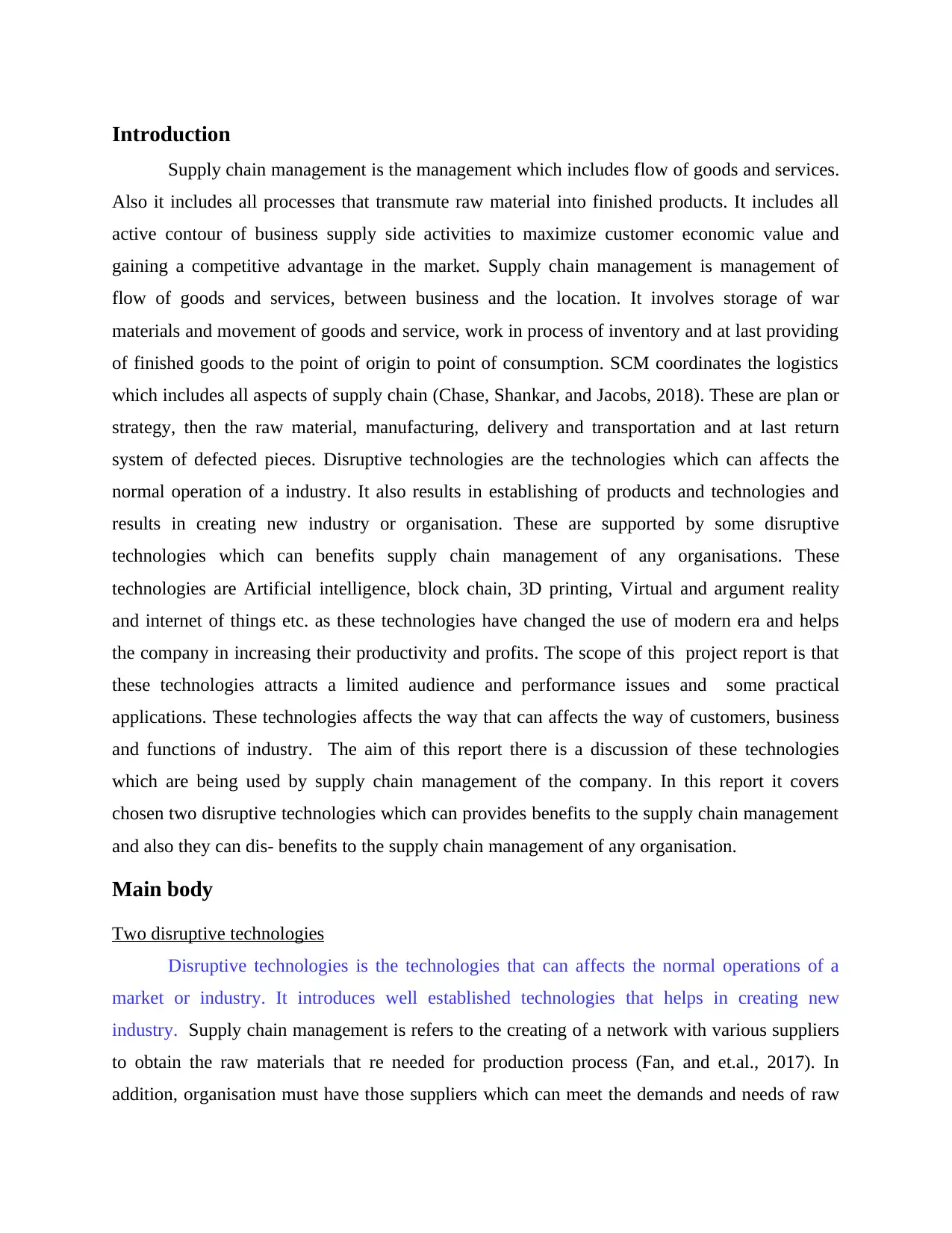
Introduction
Supply chain management is the management which includes flow of goods and services.
Also it includes all processes that transmute raw material into finished products. It includes all
active contour of business supply side activities to maximize customer economic value and
gaining a competitive advantage in the market. Supply chain management is management of
flow of goods and services, between business and the location. It involves storage of war
materials and movement of goods and service, work in process of inventory and at last providing
of finished goods to the point of origin to point of consumption. SCM coordinates the logistics
which includes all aspects of supply chain (Chase, Shankar, and Jacobs, 2018). These are plan or
strategy, then the raw material, manufacturing, delivery and transportation and at last return
system of defected pieces. Disruptive technologies are the technologies which can affects the
normal operation of a industry. It also results in establishing of products and technologies and
results in creating new industry or organisation. These are supported by some disruptive
technologies which can benefits supply chain management of any organisations. These
technologies are Artificial intelligence, block chain, 3D printing, Virtual and argument reality
and internet of things etc. as these technologies have changed the use of modern era and helps
the company in increasing their productivity and profits. The scope of this project report is that
these technologies attracts a limited audience and performance issues and some practical
applications. These technologies affects the way that can affects the way of customers, business
and functions of industry. The aim of this report there is a discussion of these technologies
which are being used by supply chain management of the company. In this report it covers
chosen two disruptive technologies which can provides benefits to the supply chain management
and also they can dis- benefits to the supply chain management of any organisation.
Main body
Two disruptive technologies
Disruptive technologies is the technologies that can affects the normal operations of a
market or industry. It introduces well established technologies that helps in creating new
industry. Supply chain management is refers to the creating of a network with various suppliers
to obtain the raw materials that re needed for production process (Fan, and et.al., 2017). In
addition, organisation must have those suppliers which can meet the demands and needs of raw
Supply chain management is the management which includes flow of goods and services.
Also it includes all processes that transmute raw material into finished products. It includes all
active contour of business supply side activities to maximize customer economic value and
gaining a competitive advantage in the market. Supply chain management is management of
flow of goods and services, between business and the location. It involves storage of war
materials and movement of goods and service, work in process of inventory and at last providing
of finished goods to the point of origin to point of consumption. SCM coordinates the logistics
which includes all aspects of supply chain (Chase, Shankar, and Jacobs, 2018). These are plan or
strategy, then the raw material, manufacturing, delivery and transportation and at last return
system of defected pieces. Disruptive technologies are the technologies which can affects the
normal operation of a industry. It also results in establishing of products and technologies and
results in creating new industry or organisation. These are supported by some disruptive
technologies which can benefits supply chain management of any organisations. These
technologies are Artificial intelligence, block chain, 3D printing, Virtual and argument reality
and internet of things etc. as these technologies have changed the use of modern era and helps
the company in increasing their productivity and profits. The scope of this project report is that
these technologies attracts a limited audience and performance issues and some practical
applications. These technologies affects the way that can affects the way of customers, business
and functions of industry. The aim of this report there is a discussion of these technologies
which are being used by supply chain management of the company. In this report it covers
chosen two disruptive technologies which can provides benefits to the supply chain management
and also they can dis- benefits to the supply chain management of any organisation.
Main body
Two disruptive technologies
Disruptive technologies is the technologies that can affects the normal operations of a
market or industry. It introduces well established technologies that helps in creating new
industry. Supply chain management is refers to the creating of a network with various suppliers
to obtain the raw materials that re needed for production process (Fan, and et.al., 2017). In
addition, organisation must have those suppliers which can meet the demands and needs of raw
⊘ This is a preview!⊘
Do you want full access?
Subscribe today to unlock all pages.

Trusted by 1+ million students worldwide
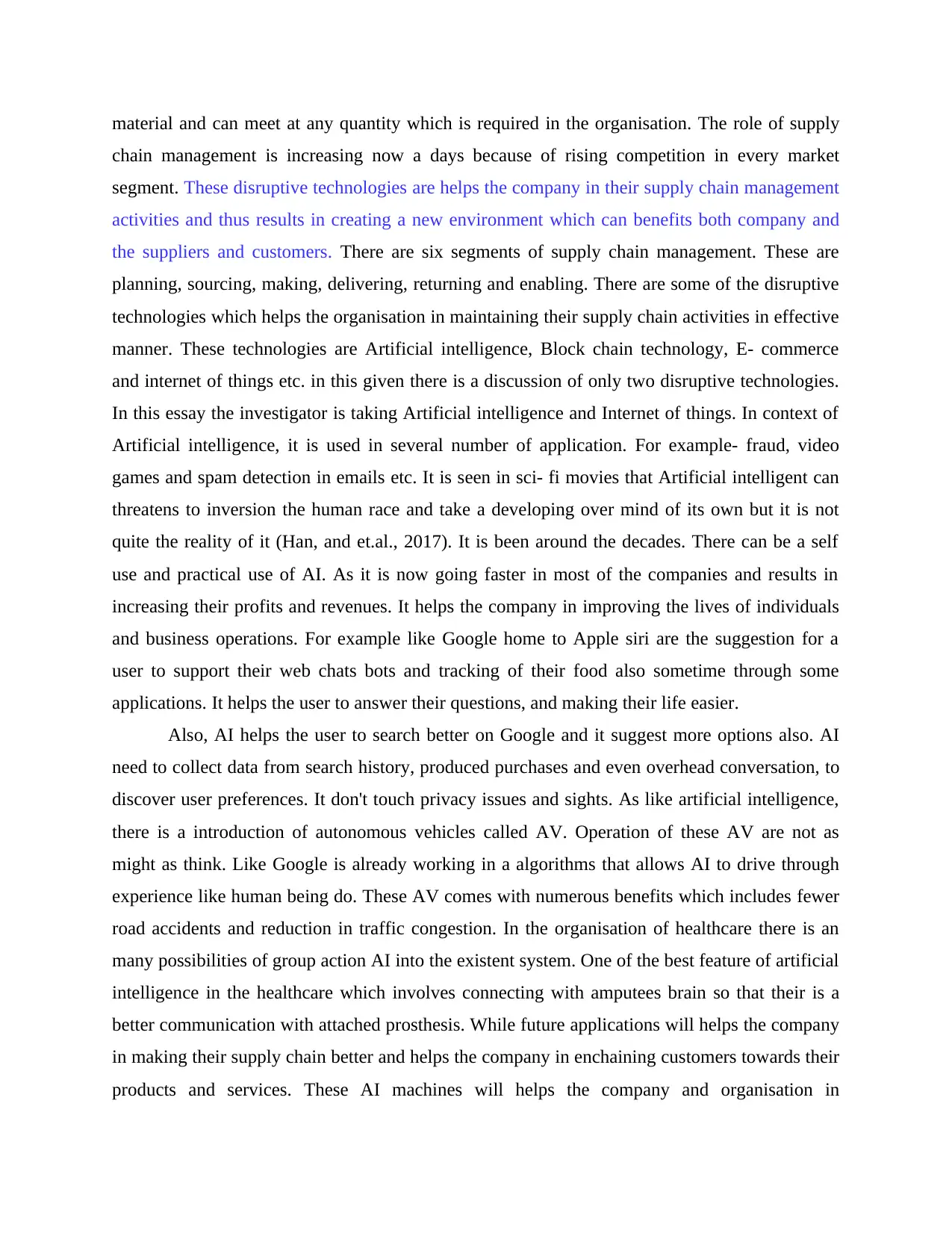
material and can meet at any quantity which is required in the organisation. The role of supply
chain management is increasing now a days because of rising competition in every market
segment. These disruptive technologies are helps the company in their supply chain management
activities and thus results in creating a new environment which can benefits both company and
the suppliers and customers. There are six segments of supply chain management. These are
planning, sourcing, making, delivering, returning and enabling. There are some of the disruptive
technologies which helps the organisation in maintaining their supply chain activities in effective
manner. These technologies are Artificial intelligence, Block chain technology, E- commerce
and internet of things etc. in this given there is a discussion of only two disruptive technologies.
In this essay the investigator is taking Artificial intelligence and Internet of things. In context of
Artificial intelligence, it is used in several number of application. For example- fraud, video
games and spam detection in emails etc. It is seen in sci- fi movies that Artificial intelligent can
threatens to inversion the human race and take a developing over mind of its own but it is not
quite the reality of it (Han, and et.al., 2017). It is been around the decades. There can be a self
use and practical use of AI. As it is now going faster in most of the companies and results in
increasing their profits and revenues. It helps the company in improving the lives of individuals
and business operations. For example like Google home to Apple siri are the suggestion for a
user to support their web chats bots and tracking of their food also sometime through some
applications. It helps the user to answer their questions, and making their life easier.
Also, AI helps the user to search better on Google and it suggest more options also. AI
need to collect data from search history, produced purchases and even overhead conversation, to
discover user preferences. It don't touch privacy issues and sights. As like artificial intelligence,
there is a introduction of autonomous vehicles called AV. Operation of these AV are not as
might as think. Like Google is already working in a algorithms that allows AI to drive through
experience like human being do. These AV comes with numerous benefits which includes fewer
road accidents and reduction in traffic congestion. In the organisation of healthcare there is an
many possibilities of group action AI into the existent system. One of the best feature of artificial
intelligence in the healthcare which involves connecting with amputees brain so that their is a
better communication with attached prosthesis. While future applications will helps the company
in making their supply chain better and helps the company in enchaining customers towards their
products and services. These AI machines will helps the company and organisation in
chain management is increasing now a days because of rising competition in every market
segment. These disruptive technologies are helps the company in their supply chain management
activities and thus results in creating a new environment which can benefits both company and
the suppliers and customers. There are six segments of supply chain management. These are
planning, sourcing, making, delivering, returning and enabling. There are some of the disruptive
technologies which helps the organisation in maintaining their supply chain activities in effective
manner. These technologies are Artificial intelligence, Block chain technology, E- commerce
and internet of things etc. in this given there is a discussion of only two disruptive technologies.
In this essay the investigator is taking Artificial intelligence and Internet of things. In context of
Artificial intelligence, it is used in several number of application. For example- fraud, video
games and spam detection in emails etc. It is seen in sci- fi movies that Artificial intelligent can
threatens to inversion the human race and take a developing over mind of its own but it is not
quite the reality of it (Han, and et.al., 2017). It is been around the decades. There can be a self
use and practical use of AI. As it is now going faster in most of the companies and results in
increasing their profits and revenues. It helps the company in improving the lives of individuals
and business operations. For example like Google home to Apple siri are the suggestion for a
user to support their web chats bots and tracking of their food also sometime through some
applications. It helps the user to answer their questions, and making their life easier.
Also, AI helps the user to search better on Google and it suggest more options also. AI
need to collect data from search history, produced purchases and even overhead conversation, to
discover user preferences. It don't touch privacy issues and sights. As like artificial intelligence,
there is a introduction of autonomous vehicles called AV. Operation of these AV are not as
might as think. Like Google is already working in a algorithms that allows AI to drive through
experience like human being do. These AV comes with numerous benefits which includes fewer
road accidents and reduction in traffic congestion. In the organisation of healthcare there is an
many possibilities of group action AI into the existent system. One of the best feature of artificial
intelligence in the healthcare which involves connecting with amputees brain so that their is a
better communication with attached prosthesis. While future applications will helps the company
in making their supply chain better and helps the company in enchaining customers towards their
products and services. These AI machines will helps the company and organisation in
Paraphrase This Document
Need a fresh take? Get an instant paraphrase of this document with our AI Paraphraser
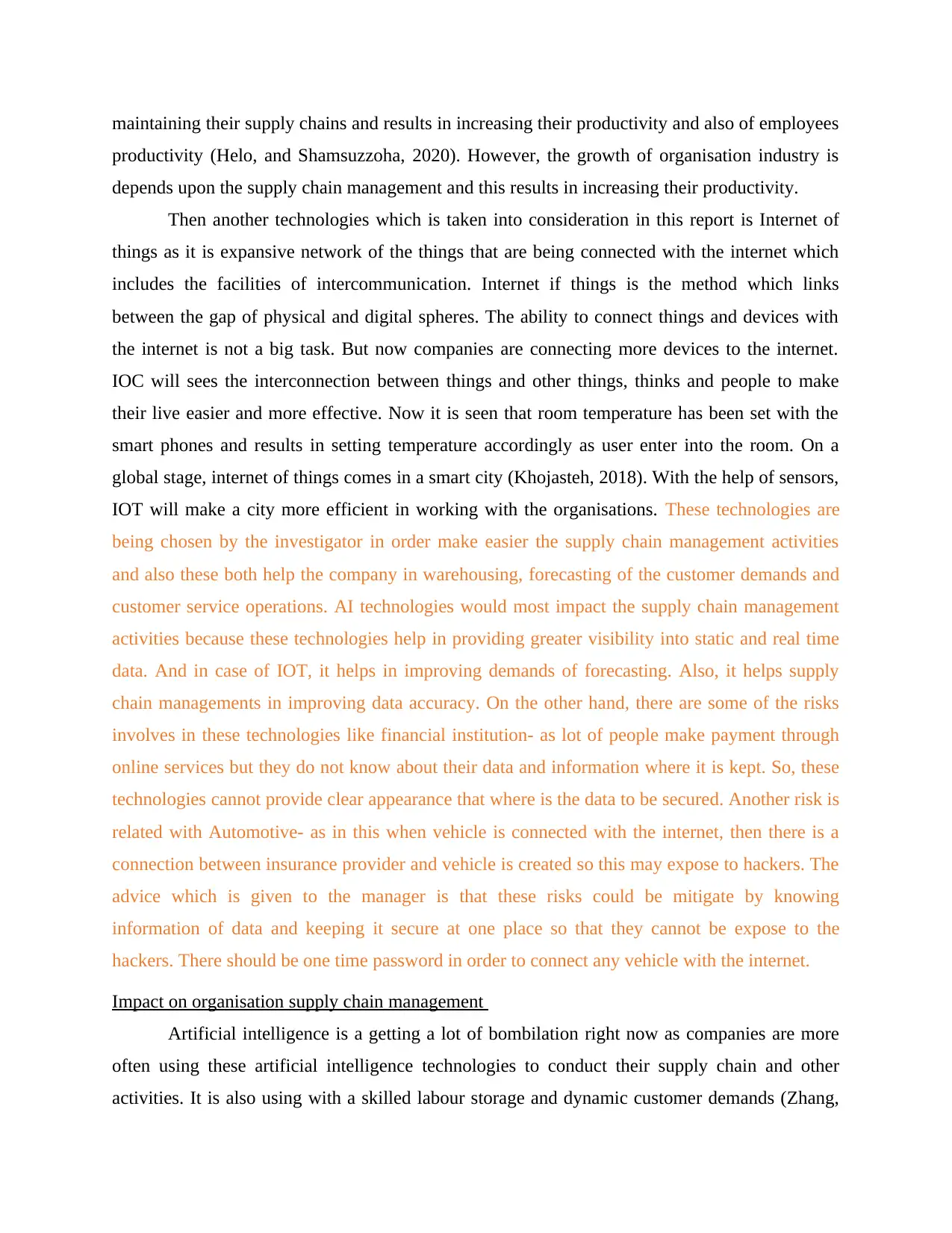
maintaining their supply chains and results in increasing their productivity and also of employees
productivity (Helo, and Shamsuzzoha, 2020). However, the growth of organisation industry is
depends upon the supply chain management and this results in increasing their productivity.
Then another technologies which is taken into consideration in this report is Internet of
things as it is expansive network of the things that are being connected with the internet which
includes the facilities of intercommunication. Internet if things is the method which links
between the gap of physical and digital spheres. The ability to connect things and devices with
the internet is not a big task. But now companies are connecting more devices to the internet.
IOC will sees the interconnection between things and other things, thinks and people to make
their live easier and more effective. Now it is seen that room temperature has been set with the
smart phones and results in setting temperature accordingly as user enter into the room. On a
global stage, internet of things comes in a smart city (Khojasteh, 2018). With the help of sensors,
IOT will make a city more efficient in working with the organisations. These technologies are
being chosen by the investigator in order make easier the supply chain management activities
and also these both help the company in warehousing, forecasting of the customer demands and
customer service operations. AI technologies would most impact the supply chain management
activities because these technologies help in providing greater visibility into static and real time
data. And in case of IOT, it helps in improving demands of forecasting. Also, it helps supply
chain managements in improving data accuracy. On the other hand, there are some of the risks
involves in these technologies like financial institution- as lot of people make payment through
online services but they do not know about their data and information where it is kept. So, these
technologies cannot provide clear appearance that where is the data to be secured. Another risk is
related with Automotive- as in this when vehicle is connected with the internet, then there is a
connection between insurance provider and vehicle is created so this may expose to hackers. The
advice which is given to the manager is that these risks could be mitigate by knowing
information of data and keeping it secure at one place so that they cannot be expose to the
hackers. There should be one time password in order to connect any vehicle with the internet.
Impact on organisation supply chain management
Artificial intelligence is a getting a lot of bombilation right now as companies are more
often using these artificial intelligence technologies to conduct their supply chain and other
activities. It is also using with a skilled labour storage and dynamic customer demands (Zhang,
productivity (Helo, and Shamsuzzoha, 2020). However, the growth of organisation industry is
depends upon the supply chain management and this results in increasing their productivity.
Then another technologies which is taken into consideration in this report is Internet of
things as it is expansive network of the things that are being connected with the internet which
includes the facilities of intercommunication. Internet if things is the method which links
between the gap of physical and digital spheres. The ability to connect things and devices with
the internet is not a big task. But now companies are connecting more devices to the internet.
IOC will sees the interconnection between things and other things, thinks and people to make
their live easier and more effective. Now it is seen that room temperature has been set with the
smart phones and results in setting temperature accordingly as user enter into the room. On a
global stage, internet of things comes in a smart city (Khojasteh, 2018). With the help of sensors,
IOT will make a city more efficient in working with the organisations. These technologies are
being chosen by the investigator in order make easier the supply chain management activities
and also these both help the company in warehousing, forecasting of the customer demands and
customer service operations. AI technologies would most impact the supply chain management
activities because these technologies help in providing greater visibility into static and real time
data. And in case of IOT, it helps in improving demands of forecasting. Also, it helps supply
chain managements in improving data accuracy. On the other hand, there are some of the risks
involves in these technologies like financial institution- as lot of people make payment through
online services but they do not know about their data and information where it is kept. So, these
technologies cannot provide clear appearance that where is the data to be secured. Another risk is
related with Automotive- as in this when vehicle is connected with the internet, then there is a
connection between insurance provider and vehicle is created so this may expose to hackers. The
advice which is given to the manager is that these risks could be mitigate by knowing
information of data and keeping it secure at one place so that they cannot be expose to the
hackers. There should be one time password in order to connect any vehicle with the internet.
Impact on organisation supply chain management
Artificial intelligence is a getting a lot of bombilation right now as companies are more
often using these artificial intelligence technologies to conduct their supply chain and other
activities. It is also using with a skilled labour storage and dynamic customer demands (Zhang,
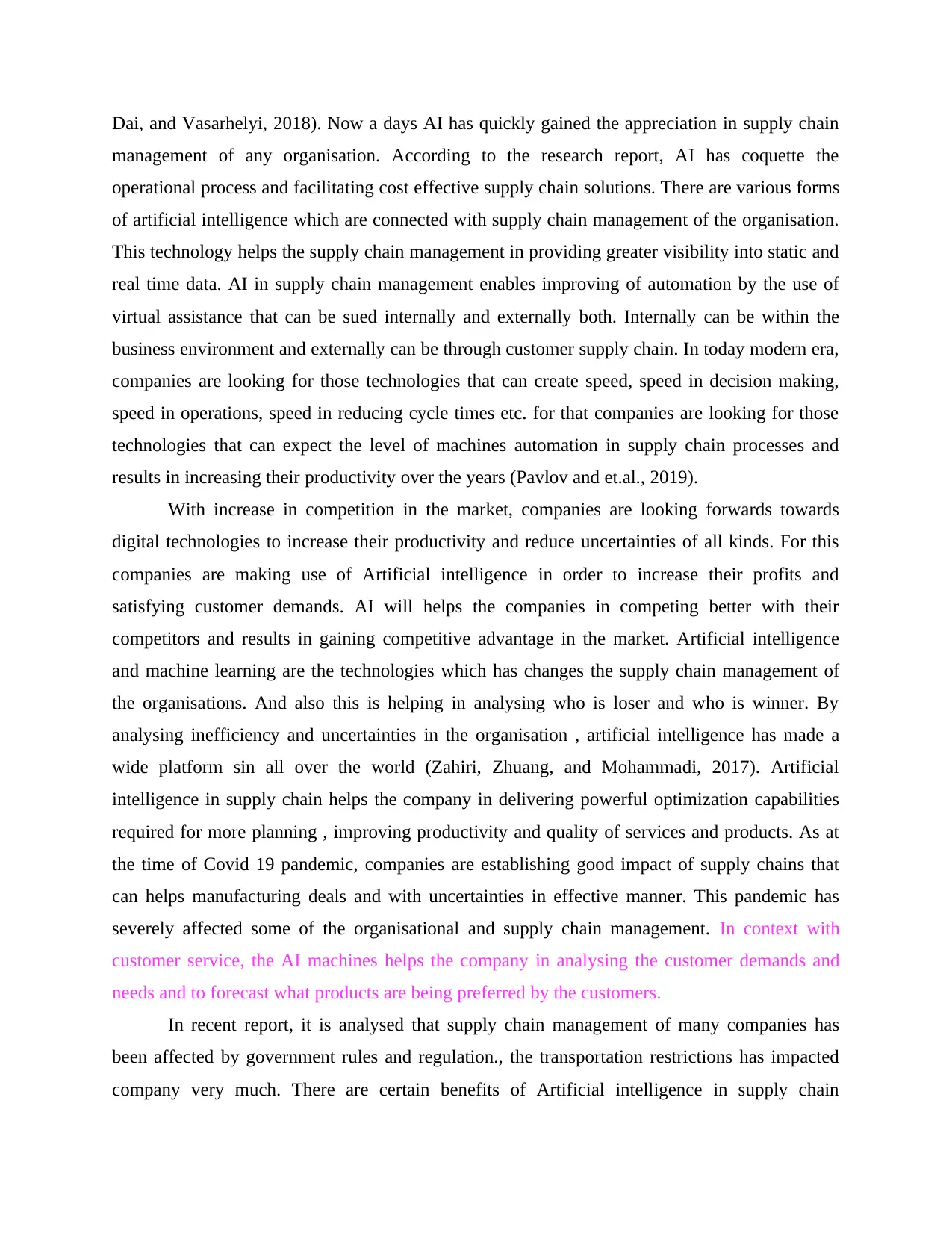
Dai, and Vasarhelyi, 2018). Now a days AI has quickly gained the appreciation in supply chain
management of any organisation. According to the research report, AI has coquette the
operational process and facilitating cost effective supply chain solutions. There are various forms
of artificial intelligence which are connected with supply chain management of the organisation.
This technology helps the supply chain management in providing greater visibility into static and
real time data. AI in supply chain management enables improving of automation by the use of
virtual assistance that can be sued internally and externally both. Internally can be within the
business environment and externally can be through customer supply chain. In today modern era,
companies are looking for those technologies that can create speed, speed in decision making,
speed in operations, speed in reducing cycle times etc. for that companies are looking for those
technologies that can expect the level of machines automation in supply chain processes and
results in increasing their productivity over the years (Pavlov and et.al., 2019).
With increase in competition in the market, companies are looking forwards towards
digital technologies to increase their productivity and reduce uncertainties of all kinds. For this
companies are making use of Artificial intelligence in order to increase their profits and
satisfying customer demands. AI will helps the companies in competing better with their
competitors and results in gaining competitive advantage in the market. Artificial intelligence
and machine learning are the technologies which has changes the supply chain management of
the organisations. And also this is helping in analysing who is loser and who is winner. By
analysing inefficiency and uncertainties in the organisation , artificial intelligence has made a
wide platform sin all over the world (Zahiri, Zhuang, and Mohammadi, 2017). Artificial
intelligence in supply chain helps the company in delivering powerful optimization capabilities
required for more planning , improving productivity and quality of services and products. As at
the time of Covid 19 pandemic, companies are establishing good impact of supply chains that
can helps manufacturing deals and with uncertainties in effective manner. This pandemic has
severely affected some of the organisational and supply chain management. In context with
customer service, the AI machines helps the company in analysing the customer demands and
needs and to forecast what products are being preferred by the customers.
In recent report, it is analysed that supply chain management of many companies has
been affected by government rules and regulation., the transportation restrictions has impacted
company very much. There are certain benefits of Artificial intelligence in supply chain
management of any organisation. According to the research report, AI has coquette the
operational process and facilitating cost effective supply chain solutions. There are various forms
of artificial intelligence which are connected with supply chain management of the organisation.
This technology helps the supply chain management in providing greater visibility into static and
real time data. AI in supply chain management enables improving of automation by the use of
virtual assistance that can be sued internally and externally both. Internally can be within the
business environment and externally can be through customer supply chain. In today modern era,
companies are looking for those technologies that can create speed, speed in decision making,
speed in operations, speed in reducing cycle times etc. for that companies are looking for those
technologies that can expect the level of machines automation in supply chain processes and
results in increasing their productivity over the years (Pavlov and et.al., 2019).
With increase in competition in the market, companies are looking forwards towards
digital technologies to increase their productivity and reduce uncertainties of all kinds. For this
companies are making use of Artificial intelligence in order to increase their profits and
satisfying customer demands. AI will helps the companies in competing better with their
competitors and results in gaining competitive advantage in the market. Artificial intelligence
and machine learning are the technologies which has changes the supply chain management of
the organisations. And also this is helping in analysing who is loser and who is winner. By
analysing inefficiency and uncertainties in the organisation , artificial intelligence has made a
wide platform sin all over the world (Zahiri, Zhuang, and Mohammadi, 2017). Artificial
intelligence in supply chain helps the company in delivering powerful optimization capabilities
required for more planning , improving productivity and quality of services and products. As at
the time of Covid 19 pandemic, companies are establishing good impact of supply chains that
can helps manufacturing deals and with uncertainties in effective manner. This pandemic has
severely affected some of the organisational and supply chain management. In context with
customer service, the AI machines helps the company in analysing the customer demands and
needs and to forecast what products are being preferred by the customers.
In recent report, it is analysed that supply chain management of many companies has
been affected by government rules and regulation., the transportation restrictions has impacted
company very much. There are certain benefits of Artificial intelligence in supply chain
⊘ This is a preview!⊘
Do you want full access?
Subscribe today to unlock all pages.

Trusted by 1+ million students worldwide
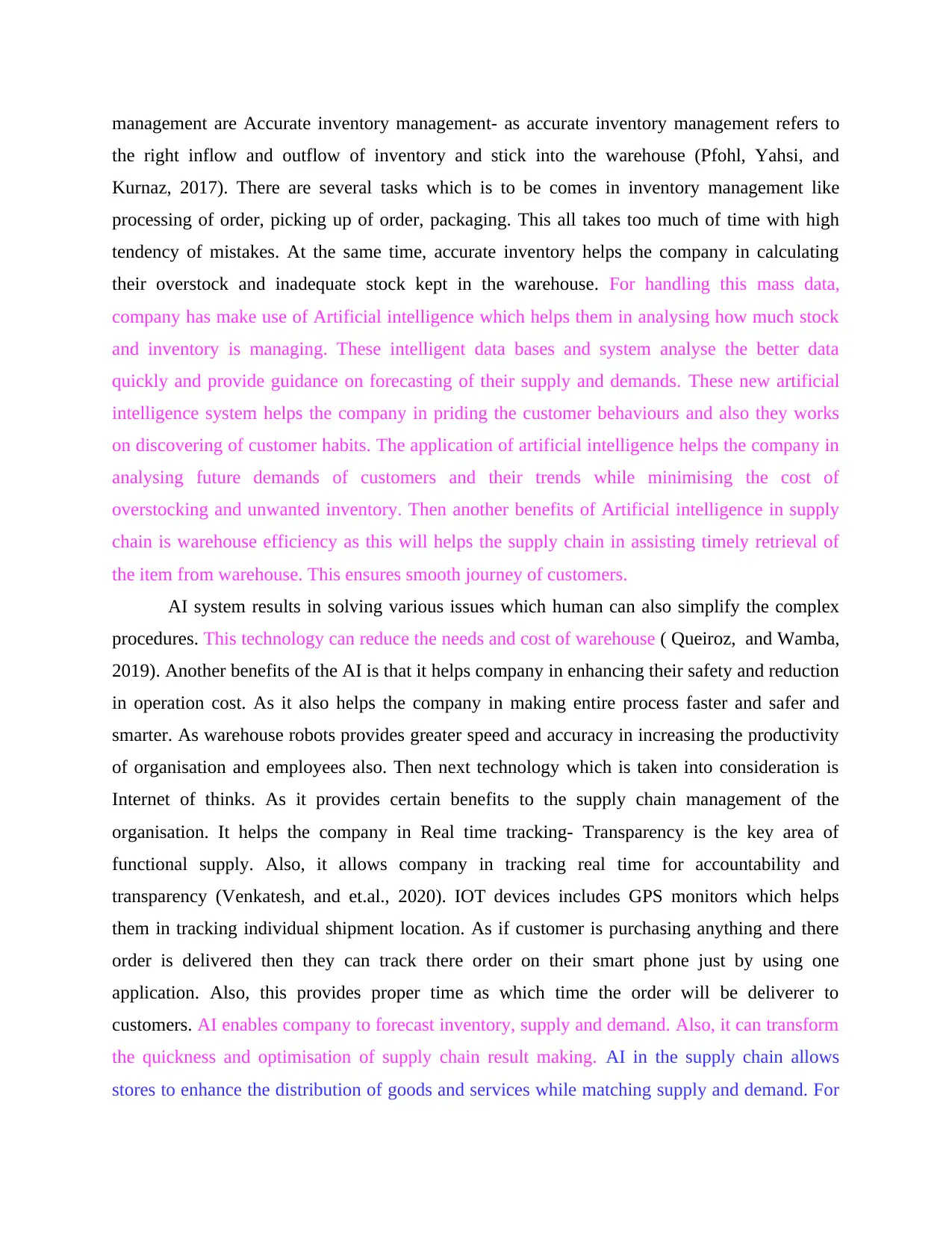
management are Accurate inventory management- as accurate inventory management refers to
the right inflow and outflow of inventory and stick into the warehouse (Pfohl, Yahsi, and
Kurnaz, 2017). There are several tasks which is to be comes in inventory management like
processing of order, picking up of order, packaging. This all takes too much of time with high
tendency of mistakes. At the same time, accurate inventory helps the company in calculating
their overstock and inadequate stock kept in the warehouse. For handling this mass data,
company has make use of Artificial intelligence which helps them in analysing how much stock
and inventory is managing. These intelligent data bases and system analyse the better data
quickly and provide guidance on forecasting of their supply and demands. These new artificial
intelligence system helps the company in priding the customer behaviours and also they works
on discovering of customer habits. The application of artificial intelligence helps the company in
analysing future demands of customers and their trends while minimising the cost of
overstocking and unwanted inventory. Then another benefits of Artificial intelligence in supply
chain is warehouse efficiency as this will helps the supply chain in assisting timely retrieval of
the item from warehouse. This ensures smooth journey of customers.
AI system results in solving various issues which human can also simplify the complex
procedures. This technology can reduce the needs and cost of warehouse ( Queiroz, and Wamba,
2019). Another benefits of the AI is that it helps company in enhancing their safety and reduction
in operation cost. As it also helps the company in making entire process faster and safer and
smarter. As warehouse robots provides greater speed and accuracy in increasing the productivity
of organisation and employees also. Then next technology which is taken into consideration is
Internet of thinks. As it provides certain benefits to the supply chain management of the
organisation. It helps the company in Real time tracking- Transparency is the key area of
functional supply. Also, it allows company in tracking real time for accountability and
transparency (Venkatesh, and et.al., 2020). IOT devices includes GPS monitors which helps
them in tracking individual shipment location. As if customer is purchasing anything and there
order is delivered then they can track there order on their smart phone just by using one
application. Also, this provides proper time as which time the order will be deliverer to
customers. AI enables company to forecast inventory, supply and demand. Also, it can transform
the quickness and optimisation of supply chain result making. AI in the supply chain allows
stores to enhance the distribution of goods and services while matching supply and demand. For
the right inflow and outflow of inventory and stick into the warehouse (Pfohl, Yahsi, and
Kurnaz, 2017). There are several tasks which is to be comes in inventory management like
processing of order, picking up of order, packaging. This all takes too much of time with high
tendency of mistakes. At the same time, accurate inventory helps the company in calculating
their overstock and inadequate stock kept in the warehouse. For handling this mass data,
company has make use of Artificial intelligence which helps them in analysing how much stock
and inventory is managing. These intelligent data bases and system analyse the better data
quickly and provide guidance on forecasting of their supply and demands. These new artificial
intelligence system helps the company in priding the customer behaviours and also they works
on discovering of customer habits. The application of artificial intelligence helps the company in
analysing future demands of customers and their trends while minimising the cost of
overstocking and unwanted inventory. Then another benefits of Artificial intelligence in supply
chain is warehouse efficiency as this will helps the supply chain in assisting timely retrieval of
the item from warehouse. This ensures smooth journey of customers.
AI system results in solving various issues which human can also simplify the complex
procedures. This technology can reduce the needs and cost of warehouse ( Queiroz, and Wamba,
2019). Another benefits of the AI is that it helps company in enhancing their safety and reduction
in operation cost. As it also helps the company in making entire process faster and safer and
smarter. As warehouse robots provides greater speed and accuracy in increasing the productivity
of organisation and employees also. Then next technology which is taken into consideration is
Internet of thinks. As it provides certain benefits to the supply chain management of the
organisation. It helps the company in Real time tracking- Transparency is the key area of
functional supply. Also, it allows company in tracking real time for accountability and
transparency (Venkatesh, and et.al., 2020). IOT devices includes GPS monitors which helps
them in tracking individual shipment location. As if customer is purchasing anything and there
order is delivered then they can track there order on their smart phone just by using one
application. Also, this provides proper time as which time the order will be deliverer to
customers. AI enables company to forecast inventory, supply and demand. Also, it can transform
the quickness and optimisation of supply chain result making. AI in the supply chain allows
stores to enhance the distribution of goods and services while matching supply and demand. For
Paraphrase This Document
Need a fresh take? Get an instant paraphrase of this document with our AI Paraphraser
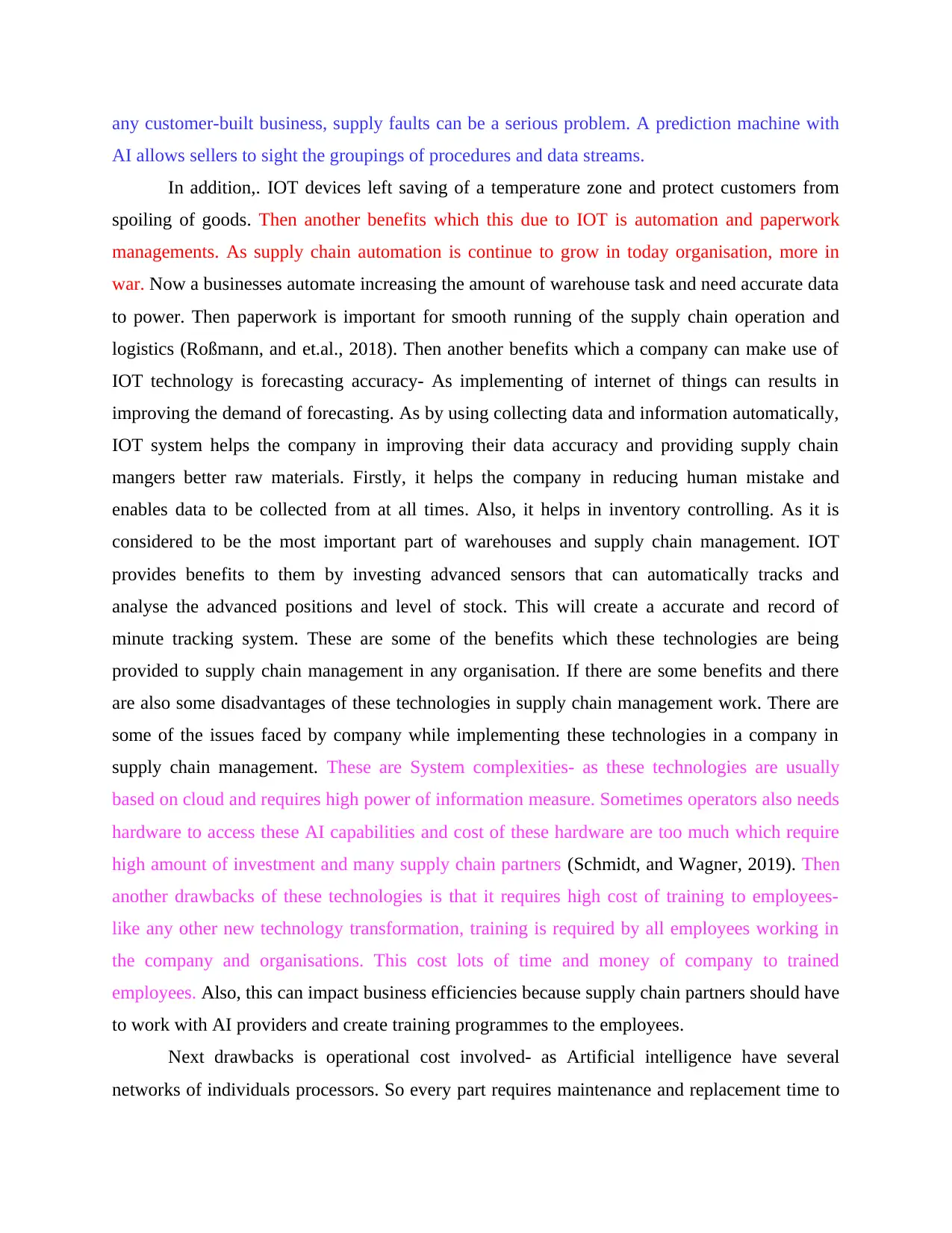
any customer-built business, supply faults can be a serious problem. A prediction machine with
AI allows sellers to sight the groupings of procedures and data streams.
In addition,. IOT devices left saving of a temperature zone and protect customers from
spoiling of goods. Then another benefits which this due to IOT is automation and paperwork
managements. As supply chain automation is continue to grow in today organisation, more in
war. Now a businesses automate increasing the amount of warehouse task and need accurate data
to power. Then paperwork is important for smooth running of the supply chain operation and
logistics (Roßmann, and et.al., 2018). Then another benefits which a company can make use of
IOT technology is forecasting accuracy- As implementing of internet of things can results in
improving the demand of forecasting. As by using collecting data and information automatically,
IOT system helps the company in improving their data accuracy and providing supply chain
mangers better raw materials. Firstly, it helps the company in reducing human mistake and
enables data to be collected from at all times. Also, it helps in inventory controlling. As it is
considered to be the most important part of warehouses and supply chain management. IOT
provides benefits to them by investing advanced sensors that can automatically tracks and
analyse the advanced positions and level of stock. This will create a accurate and record of
minute tracking system. These are some of the benefits which these technologies are being
provided to supply chain management in any organisation. If there are some benefits and there
are also some disadvantages of these technologies in supply chain management work. There are
some of the issues faced by company while implementing these technologies in a company in
supply chain management. These are System complexities- as these technologies are usually
based on cloud and requires high power of information measure. Sometimes operators also needs
hardware to access these AI capabilities and cost of these hardware are too much which require
high amount of investment and many supply chain partners (Schmidt, and Wagner, 2019). Then
another drawbacks of these technologies is that it requires high cost of training to employees-
like any other new technology transformation, training is required by all employees working in
the company and organisations. This cost lots of time and money of company to trained
employees. Also, this can impact business efficiencies because supply chain partners should have
to work with AI providers and create training programmes to the employees.
Next drawbacks is operational cost involved- as Artificial intelligence have several
networks of individuals processors. So every part requires maintenance and replacement time to
AI allows sellers to sight the groupings of procedures and data streams.
In addition,. IOT devices left saving of a temperature zone and protect customers from
spoiling of goods. Then another benefits which this due to IOT is automation and paperwork
managements. As supply chain automation is continue to grow in today organisation, more in
war. Now a businesses automate increasing the amount of warehouse task and need accurate data
to power. Then paperwork is important for smooth running of the supply chain operation and
logistics (Roßmann, and et.al., 2018). Then another benefits which a company can make use of
IOT technology is forecasting accuracy- As implementing of internet of things can results in
improving the demand of forecasting. As by using collecting data and information automatically,
IOT system helps the company in improving their data accuracy and providing supply chain
mangers better raw materials. Firstly, it helps the company in reducing human mistake and
enables data to be collected from at all times. Also, it helps in inventory controlling. As it is
considered to be the most important part of warehouses and supply chain management. IOT
provides benefits to them by investing advanced sensors that can automatically tracks and
analyse the advanced positions and level of stock. This will create a accurate and record of
minute tracking system. These are some of the benefits which these technologies are being
provided to supply chain management in any organisation. If there are some benefits and there
are also some disadvantages of these technologies in supply chain management work. There are
some of the issues faced by company while implementing these technologies in a company in
supply chain management. These are System complexities- as these technologies are usually
based on cloud and requires high power of information measure. Sometimes operators also needs
hardware to access these AI capabilities and cost of these hardware are too much which require
high amount of investment and many supply chain partners (Schmidt, and Wagner, 2019). Then
another drawbacks of these technologies is that it requires high cost of training to employees-
like any other new technology transformation, training is required by all employees working in
the company and organisations. This cost lots of time and money of company to trained
employees. Also, this can impact business efficiencies because supply chain partners should have
to work with AI providers and create training programmes to the employees.
Next drawbacks is operational cost involved- as Artificial intelligence have several
networks of individuals processors. So every part requires maintenance and replacement time to
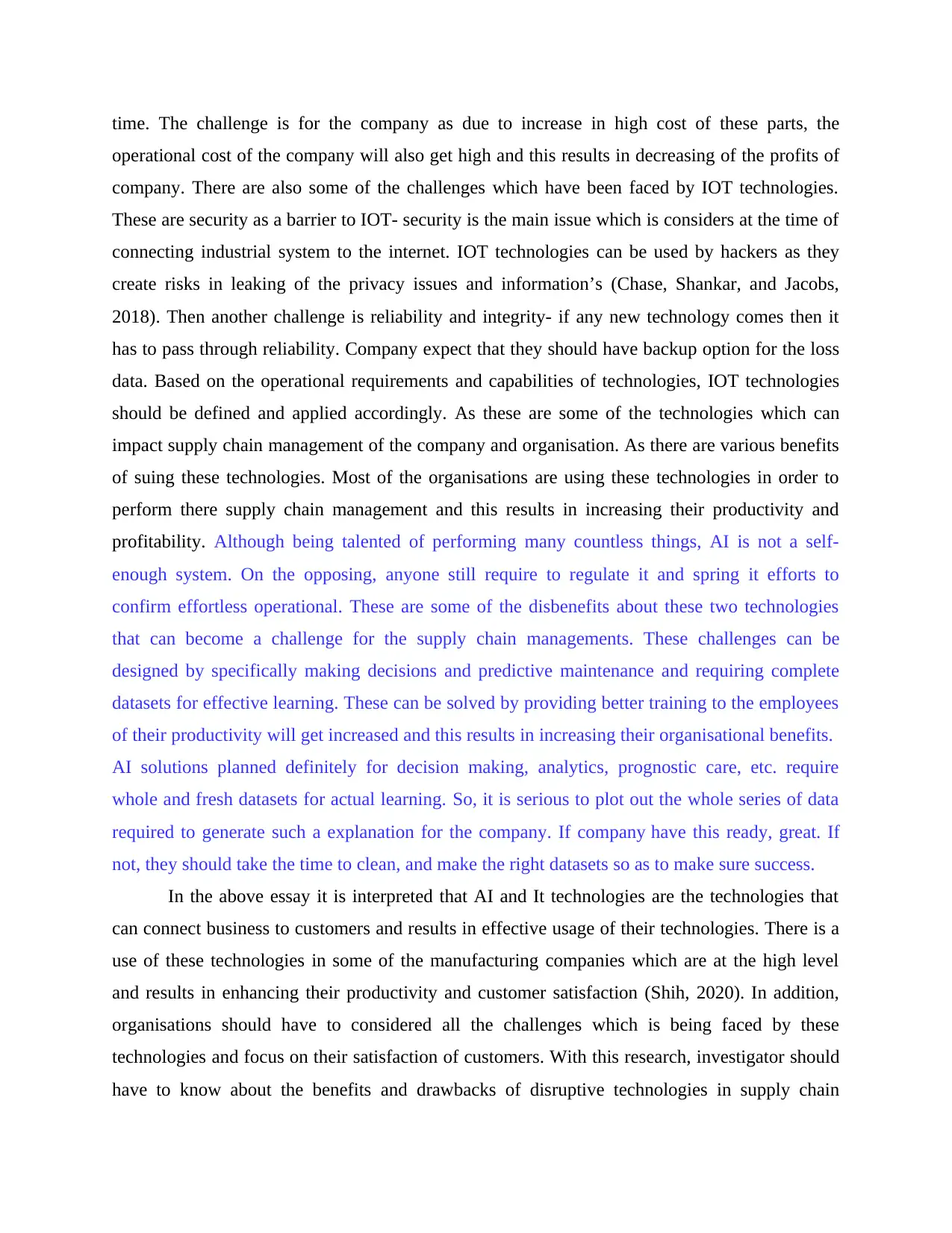
time. The challenge is for the company as due to increase in high cost of these parts, the
operational cost of the company will also get high and this results in decreasing of the profits of
company. There are also some of the challenges which have been faced by IOT technologies.
These are security as a barrier to IOT- security is the main issue which is considers at the time of
connecting industrial system to the internet. IOT technologies can be used by hackers as they
create risks in leaking of the privacy issues and information’s (Chase, Shankar, and Jacobs,
2018). Then another challenge is reliability and integrity- if any new technology comes then it
has to pass through reliability. Company expect that they should have backup option for the loss
data. Based on the operational requirements and capabilities of technologies, IOT technologies
should be defined and applied accordingly. As these are some of the technologies which can
impact supply chain management of the company and organisation. As there are various benefits
of suing these technologies. Most of the organisations are using these technologies in order to
perform there supply chain management and this results in increasing their productivity and
profitability. Although being talented of performing many countless things, AI is not a self-
enough system. On the opposing, anyone still require to regulate it and spring it efforts to
confirm effortless operational. These are some of the disbenefits about these two technologies
that can become a challenge for the supply chain managements. These challenges can be
designed by specifically making decisions and predictive maintenance and requiring complete
datasets for effective learning. These can be solved by providing better training to the employees
of their productivity will get increased and this results in increasing their organisational benefits.
AI solutions planned definitely for decision making, analytics, prognostic care, etc. require
whole and fresh datasets for actual learning. So, it is serious to plot out the whole series of data
required to generate such a explanation for the company. If company have this ready, great. If
not, they should take the time to clean, and make the right datasets so as to make sure success.
In the above essay it is interpreted that AI and It technologies are the technologies that
can connect business to customers and results in effective usage of their technologies. There is a
use of these technologies in some of the manufacturing companies which are at the high level
and results in enhancing their productivity and customer satisfaction (Shih, 2020). In addition,
organisations should have to considered all the challenges which is being faced by these
technologies and focus on their satisfaction of customers. With this research, investigator should
have to know about the benefits and drawbacks of disruptive technologies in supply chain
operational cost of the company will also get high and this results in decreasing of the profits of
company. There are also some of the challenges which have been faced by IOT technologies.
These are security as a barrier to IOT- security is the main issue which is considers at the time of
connecting industrial system to the internet. IOT technologies can be used by hackers as they
create risks in leaking of the privacy issues and information’s (Chase, Shankar, and Jacobs,
2018). Then another challenge is reliability and integrity- if any new technology comes then it
has to pass through reliability. Company expect that they should have backup option for the loss
data. Based on the operational requirements and capabilities of technologies, IOT technologies
should be defined and applied accordingly. As these are some of the technologies which can
impact supply chain management of the company and organisation. As there are various benefits
of suing these technologies. Most of the organisations are using these technologies in order to
perform there supply chain management and this results in increasing their productivity and
profitability. Although being talented of performing many countless things, AI is not a self-
enough system. On the opposing, anyone still require to regulate it and spring it efforts to
confirm effortless operational. These are some of the disbenefits about these two technologies
that can become a challenge for the supply chain managements. These challenges can be
designed by specifically making decisions and predictive maintenance and requiring complete
datasets for effective learning. These can be solved by providing better training to the employees
of their productivity will get increased and this results in increasing their organisational benefits.
AI solutions planned definitely for decision making, analytics, prognostic care, etc. require
whole and fresh datasets for actual learning. So, it is serious to plot out the whole series of data
required to generate such a explanation for the company. If company have this ready, great. If
not, they should take the time to clean, and make the right datasets so as to make sure success.
In the above essay it is interpreted that AI and It technologies are the technologies that
can connect business to customers and results in effective usage of their technologies. There is a
use of these technologies in some of the manufacturing companies which are at the high level
and results in enhancing their productivity and customer satisfaction (Shih, 2020). In addition,
organisations should have to considered all the challenges which is being faced by these
technologies and focus on their satisfaction of customers. With this research, investigator should
have to know about the benefits and drawbacks of disruptive technologies in supply chain
⊘ This is a preview!⊘
Do you want full access?
Subscribe today to unlock all pages.

Trusted by 1+ million students worldwide
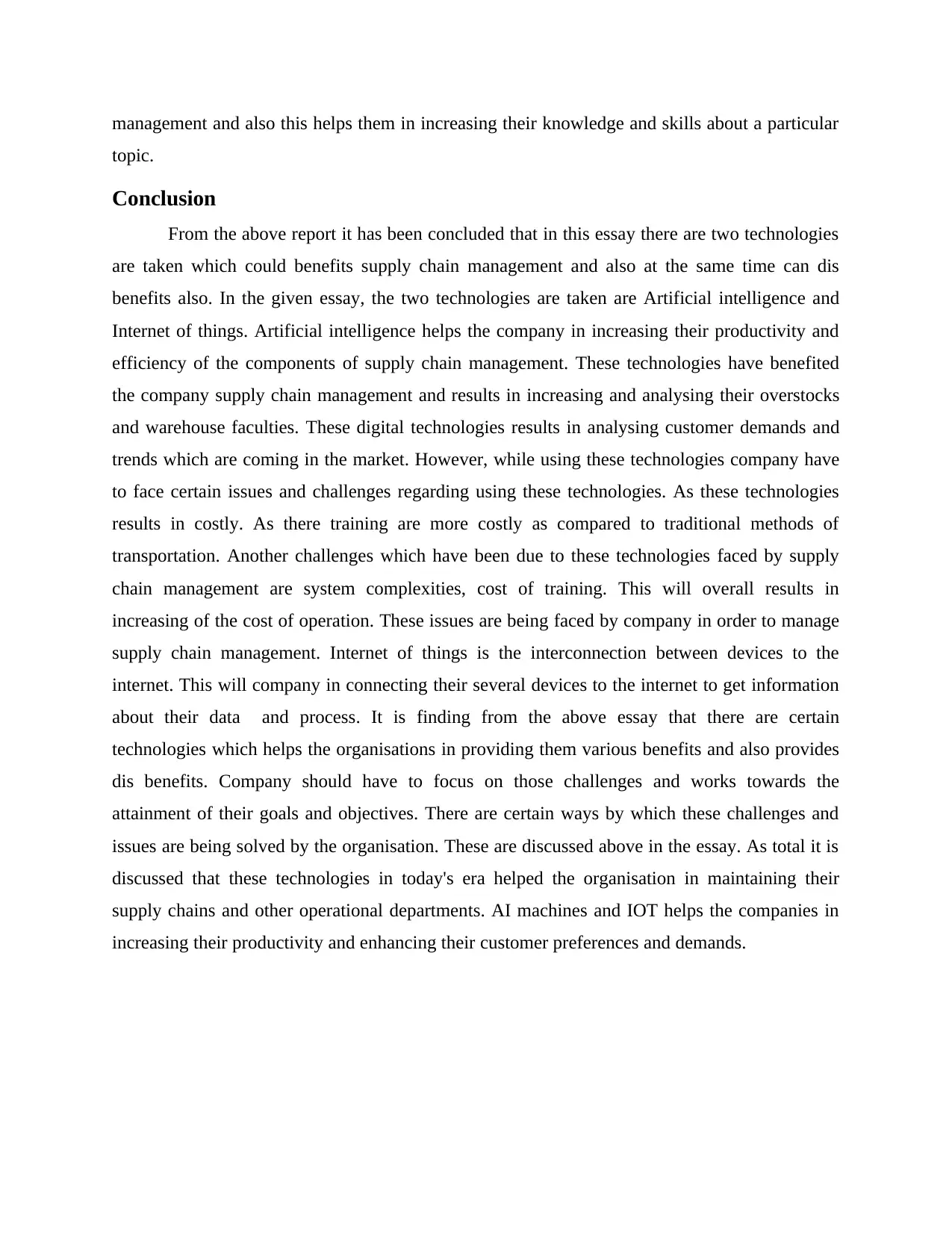
management and also this helps them in increasing their knowledge and skills about a particular
topic.
Conclusion
From the above report it has been concluded that in this essay there are two technologies
are taken which could benefits supply chain management and also at the same time can dis
benefits also. In the given essay, the two technologies are taken are Artificial intelligence and
Internet of things. Artificial intelligence helps the company in increasing their productivity and
efficiency of the components of supply chain management. These technologies have benefited
the company supply chain management and results in increasing and analysing their overstocks
and warehouse faculties. These digital technologies results in analysing customer demands and
trends which are coming in the market. However, while using these technologies company have
to face certain issues and challenges regarding using these technologies. As these technologies
results in costly. As there training are more costly as compared to traditional methods of
transportation. Another challenges which have been due to these technologies faced by supply
chain management are system complexities, cost of training. This will overall results in
increasing of the cost of operation. These issues are being faced by company in order to manage
supply chain management. Internet of things is the interconnection between devices to the
internet. This will company in connecting their several devices to the internet to get information
about their data and process. It is finding from the above essay that there are certain
technologies which helps the organisations in providing them various benefits and also provides
dis benefits. Company should have to focus on those challenges and works towards the
attainment of their goals and objectives. There are certain ways by which these challenges and
issues are being solved by the organisation. These are discussed above in the essay. As total it is
discussed that these technologies in today's era helped the organisation in maintaining their
supply chains and other operational departments. AI machines and IOT helps the companies in
increasing their productivity and enhancing their customer preferences and demands.
topic.
Conclusion
From the above report it has been concluded that in this essay there are two technologies
are taken which could benefits supply chain management and also at the same time can dis
benefits also. In the given essay, the two technologies are taken are Artificial intelligence and
Internet of things. Artificial intelligence helps the company in increasing their productivity and
efficiency of the components of supply chain management. These technologies have benefited
the company supply chain management and results in increasing and analysing their overstocks
and warehouse faculties. These digital technologies results in analysing customer demands and
trends which are coming in the market. However, while using these technologies company have
to face certain issues and challenges regarding using these technologies. As these technologies
results in costly. As there training are more costly as compared to traditional methods of
transportation. Another challenges which have been due to these technologies faced by supply
chain management are system complexities, cost of training. This will overall results in
increasing of the cost of operation. These issues are being faced by company in order to manage
supply chain management. Internet of things is the interconnection between devices to the
internet. This will company in connecting their several devices to the internet to get information
about their data and process. It is finding from the above essay that there are certain
technologies which helps the organisations in providing them various benefits and also provides
dis benefits. Company should have to focus on those challenges and works towards the
attainment of their goals and objectives. There are certain ways by which these challenges and
issues are being solved by the organisation. These are discussed above in the essay. As total it is
discussed that these technologies in today's era helped the organisation in maintaining their
supply chains and other operational departments. AI machines and IOT helps the companies in
increasing their productivity and enhancing their customer preferences and demands.
Paraphrase This Document
Need a fresh take? Get an instant paraphrase of this document with our AI Paraphraser
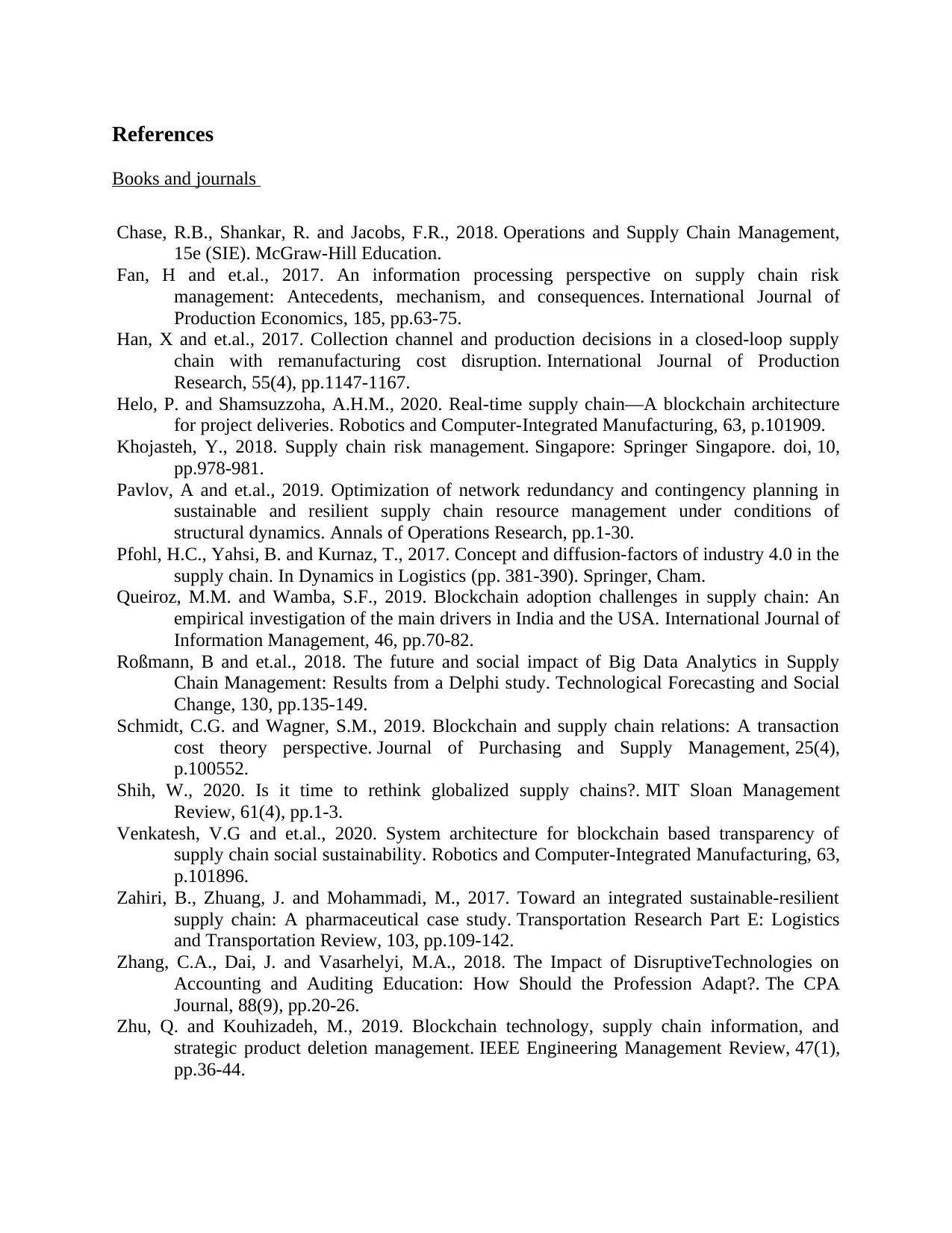
References
Books and journals
Chase, R.B., Shankar, R. and Jacobs, F.R., 2018. Operations and Supply Chain Management,
15e (SIE). McGraw-Hill Education.
Fan, H and et.al., 2017. An information processing perspective on supply chain risk
management: Antecedents, mechanism, and consequences. International Journal of
Production Economics, 185, pp.63-75.
Han, X and et.al., 2017. Collection channel and production decisions in a closed-loop supply
chain with remanufacturing cost disruption. International Journal of Production
Research, 55(4), pp.1147-1167.
Helo, P. and Shamsuzzoha, A.H.M., 2020. Real-time supply chain—A blockchain architecture
for project deliveries. Robotics and Computer-Integrated Manufacturing, 63, p.101909.
Khojasteh, Y., 2018. Supply chain risk management. Singapore: Springer Singapore. doi, 10,
pp.978-981.
Pavlov, A and et.al., 2019. Optimization of network redundancy and contingency planning in
sustainable and resilient supply chain resource management under conditions of
structural dynamics. Annals of Operations Research, pp.1-30.
Pfohl, H.C., Yahsi, B. and Kurnaz, T., 2017. Concept and diffusion-factors of industry 4.0 in the
supply chain. In Dynamics in Logistics (pp. 381-390). Springer, Cham.
Queiroz, M.M. and Wamba, S.F., 2019. Blockchain adoption challenges in supply chain: An
empirical investigation of the main drivers in India and the USA. International Journal of
Information Management, 46, pp.70-82.
Roßmann, B and et.al., 2018. The future and social impact of Big Data Analytics in Supply
Chain Management: Results from a Delphi study. Technological Forecasting and Social
Change, 130, pp.135-149.
Schmidt, C.G. and Wagner, S.M., 2019. Blockchain and supply chain relations: A transaction
cost theory perspective. Journal of Purchasing and Supply Management, 25(4),
p.100552.
Shih, W., 2020. Is it time to rethink globalized supply chains?. MIT Sloan Management
Review, 61(4), pp.1-3.
Venkatesh, V.G and et.al., 2020. System architecture for blockchain based transparency of
supply chain social sustainability. Robotics and Computer-Integrated Manufacturing, 63,
p.101896.
Zahiri, B., Zhuang, J. and Mohammadi, M., 2017. Toward an integrated sustainable-resilient
supply chain: A pharmaceutical case study. Transportation Research Part E: Logistics
and Transportation Review, 103, pp.109-142.
Zhang, C.A., Dai, J. and Vasarhelyi, M.A., 2018. The Impact of DisruptiveTechnologies on
Accounting and Auditing Education: How Should the Profession Adapt?. The CPA
Journal, 88(9), pp.20-26.
Zhu, Q. and Kouhizadeh, M., 2019. Blockchain technology, supply chain information, and
strategic product deletion management. IEEE Engineering Management Review, 47(1),
pp.36-44.
Books and journals
Chase, R.B., Shankar, R. and Jacobs, F.R., 2018. Operations and Supply Chain Management,
15e (SIE). McGraw-Hill Education.
Fan, H and et.al., 2017. An information processing perspective on supply chain risk
management: Antecedents, mechanism, and consequences. International Journal of
Production Economics, 185, pp.63-75.
Han, X and et.al., 2017. Collection channel and production decisions in a closed-loop supply
chain with remanufacturing cost disruption. International Journal of Production
Research, 55(4), pp.1147-1167.
Helo, P. and Shamsuzzoha, A.H.M., 2020. Real-time supply chain—A blockchain architecture
for project deliveries. Robotics and Computer-Integrated Manufacturing, 63, p.101909.
Khojasteh, Y., 2018. Supply chain risk management. Singapore: Springer Singapore. doi, 10,
pp.978-981.
Pavlov, A and et.al., 2019. Optimization of network redundancy and contingency planning in
sustainable and resilient supply chain resource management under conditions of
structural dynamics. Annals of Operations Research, pp.1-30.
Pfohl, H.C., Yahsi, B. and Kurnaz, T., 2017. Concept and diffusion-factors of industry 4.0 in the
supply chain. In Dynamics in Logistics (pp. 381-390). Springer, Cham.
Queiroz, M.M. and Wamba, S.F., 2019. Blockchain adoption challenges in supply chain: An
empirical investigation of the main drivers in India and the USA. International Journal of
Information Management, 46, pp.70-82.
Roßmann, B and et.al., 2018. The future and social impact of Big Data Analytics in Supply
Chain Management: Results from a Delphi study. Technological Forecasting and Social
Change, 130, pp.135-149.
Schmidt, C.G. and Wagner, S.M., 2019. Blockchain and supply chain relations: A transaction
cost theory perspective. Journal of Purchasing and Supply Management, 25(4),
p.100552.
Shih, W., 2020. Is it time to rethink globalized supply chains?. MIT Sloan Management
Review, 61(4), pp.1-3.
Venkatesh, V.G and et.al., 2020. System architecture for blockchain based transparency of
supply chain social sustainability. Robotics and Computer-Integrated Manufacturing, 63,
p.101896.
Zahiri, B., Zhuang, J. and Mohammadi, M., 2017. Toward an integrated sustainable-resilient
supply chain: A pharmaceutical case study. Transportation Research Part E: Logistics
and Transportation Review, 103, pp.109-142.
Zhang, C.A., Dai, J. and Vasarhelyi, M.A., 2018. The Impact of DisruptiveTechnologies on
Accounting and Auditing Education: How Should the Profession Adapt?. The CPA
Journal, 88(9), pp.20-26.
Zhu, Q. and Kouhizadeh, M., 2019. Blockchain technology, supply chain information, and
strategic product deletion management. IEEE Engineering Management Review, 47(1),
pp.36-44.
1 out of 11
Related Documents
Your All-in-One AI-Powered Toolkit for Academic Success.
+13062052269
info@desklib.com
Available 24*7 on WhatsApp / Email
![[object Object]](/_next/static/media/star-bottom.7253800d.svg)
Unlock your academic potential
Copyright © 2020–2026 A2Z Services. All Rights Reserved. Developed and managed by ZUCOL.





